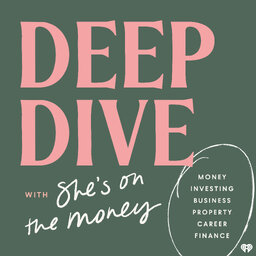DeepSeek, Trump’s Tariffs & Interest Rates: Investing Smarter in 2025
She's On The Money
Australia’s #1 finance podcast. Ready to take control of your money without the stress (or boring lectures)? This is the show for you. Hosted by award…The investing world in 2025 is full of change—but is that a bad thing? AI is shaking things up (again), Trump’s tariffs are making headlines, and interest rates are keeping us on our toes. But what does it actually mean for your money? If investing news feels like a mix of big headlines and even bigger question marks, we’ve got you. Markets move fast, but smart investing isn’t about chasing trends. So, let’s break it all down (no finance degree required) and help you invest with confidence, not confusion.
If you want to dive into more investing episodes, check out our investing playlist here.
Join our 300K+ She's on the Money community in our Facebook Group and on Instagram.
Acknowledgement of Country By Natarsha Bamblett aka Queen Acknowledgements.
The advice shared on She's On The Money is general in nature and does not consider your individual circumstances. She's On The Money exists purely for educational purposes and should not be relied upon to make an investment or financial decision. If you do choose to buy a financial product, read the PDS, TMD and obtain appropriate financial advice tailored towards your needs. Victoria Devine and She's On The Money are authorised representatives of Money Sherpa PTY LTD ABN - 321649 27708, AFSL - 451289.
In 1 playlist(s)
She's On The Money
Millennial money expert Victoria Devine shares her foolproof tips for financial freedom.Social links
Follow podcast
Recent clips

Is a Guarantor on a Property Loan a Smart Move? Plus, When Using Your Super Early Makes Sense
36:39

The Small Habits That Quietly Made Us Richer
28:44

The $75k Property Nightmare We Didn’t See Coming
40:42
 She's On The Money
She's On The Money